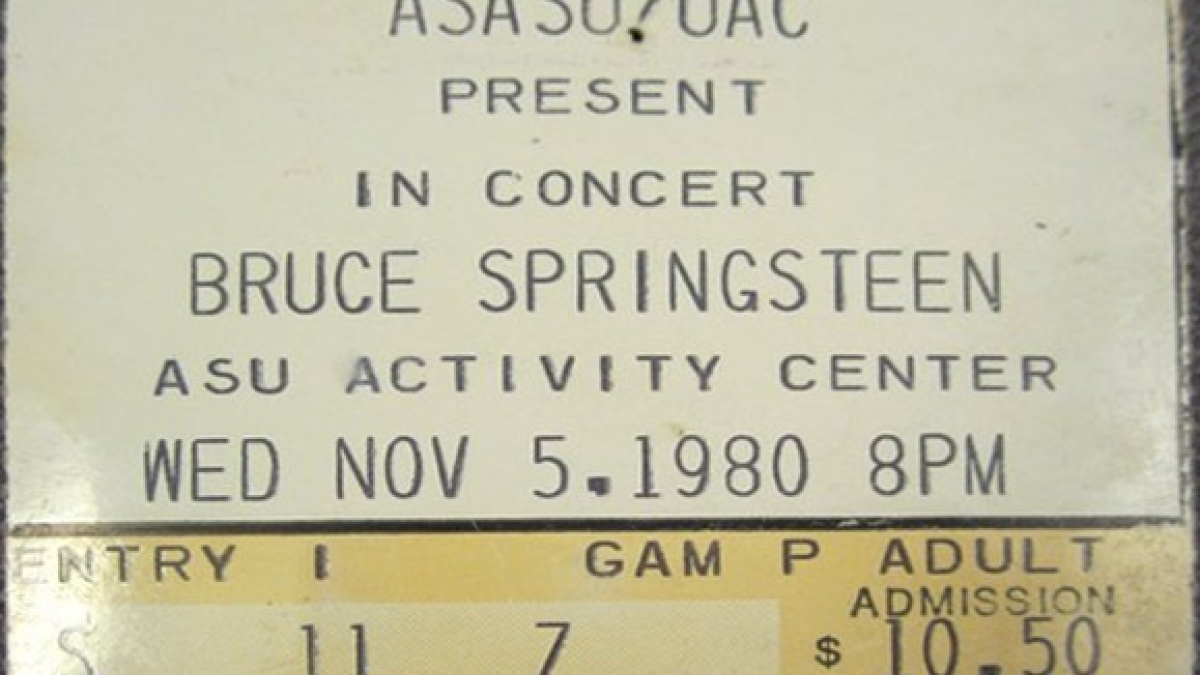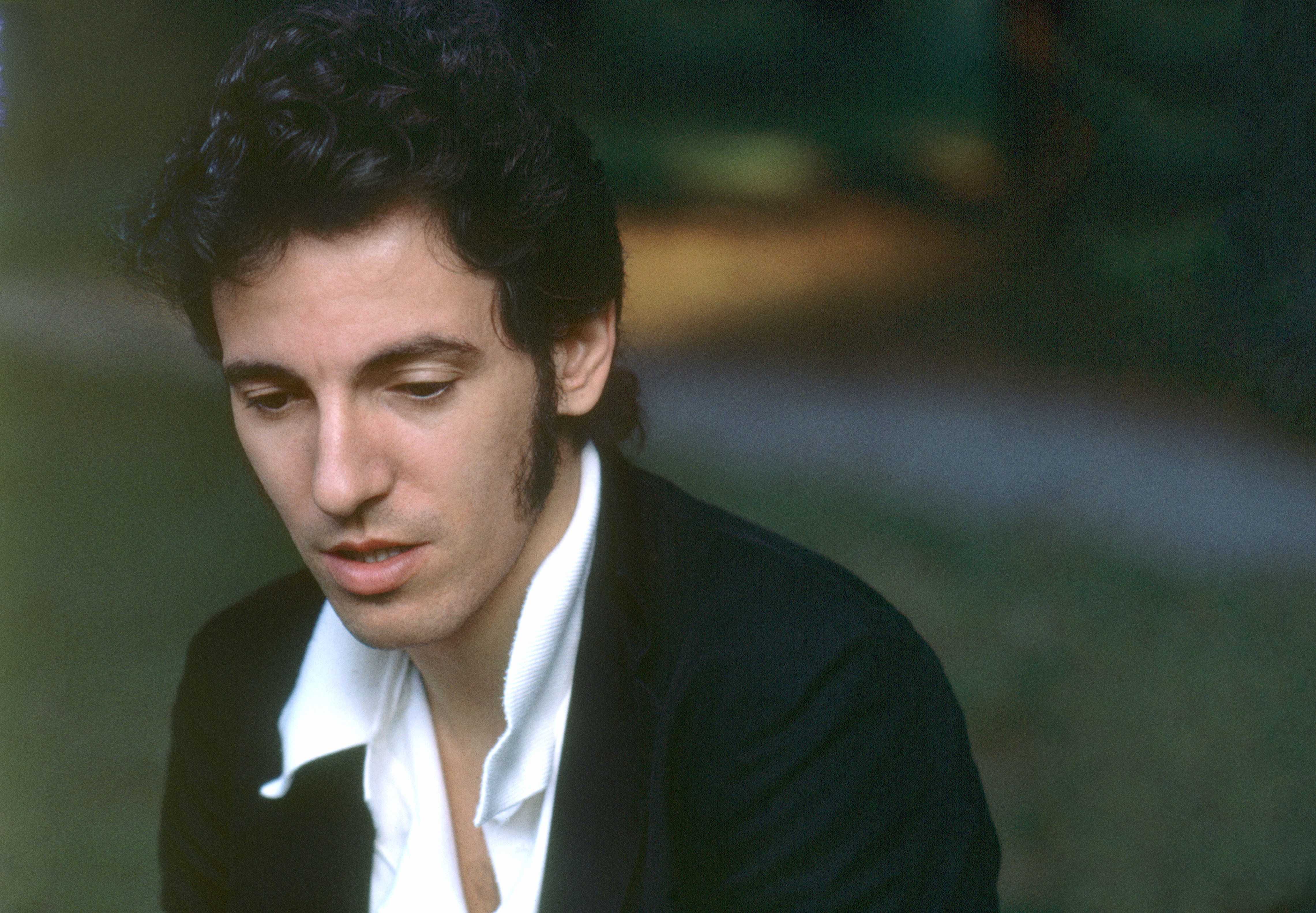In the first decade of his career, Bruce Springsteen sang about love, freedom and the loss of American values. But never once did the rock singer and songwriter espouse a political point of view.
That all changed on Nov. 5, 1980 — the day after Ronald Reagan was elected the 40th president of the United States, and the same week Springsteen’s double album, “The River,” hit No. 1 on the Billboard charts.
Long suspected to have Democratic sympathies, the New Jersey rocker often expressed his mixed bag of unrestricted individualism and crisis of the American spirit through his lyrics. However, he kept his political leanings to himself. But Reagan’s landslide victory over Jimmy Carter apparently confounded the singer, and the reactions bubbling inside him came out the next night during a concert at ASU’s Activity CenterThe ASU Activity Center is known today as Wells Fargo Arena..
“All you guys in the aisle find your seats, OK? There’s gonna be a real long show,” Springsteen said to a capacity crowd of about 10,700 people.
Naturally, the audience roared with applause and The Boss followed with his usual live gusto — including an inspired, rousing performance of “Two Hearts.” But it was what he said a few songs later that made this concert so memorable for many of his fans.
Bruce Springsteen, shown during the era of his 1980 concert at ASU. Courtesy photo.
As Springsteen and his famed E Street Band finished the title track to “The River,” he addressed the crowd as he had never done before.
“I don’t know what you guys think about what happened last night, but I think it’s pretty frightening. You guys are young — there’s gonna be a lot of people depending on you coming up, so this is for you.”
Again, the crowd erupted with applause. They were witness to Springsteen’s political coming-out party, and a concert that has become legendary among the musician’s fans and archivists.
Greil Marcus,the prominent music journalist and cultural critic, saw the Tempe concert as a game-changer. "The songs Springsteen will now be writing will have something to do with the events of Nov. 4,” Marcus wrote at the time. “Those songs will not likely comment on those events; they will, I think, reflect those moments back to us, fixing moods and telling stories that are, at present, out of reach.”
That famed night in Tempe, as well as hours of unreleased material, has been preserved for posterity in the new box set, “The Ties That Bind: The River Collection,” released on Dec. 4. The 4-CD and 3-DVD set includes the original “The River” double album; a CD of outtakes; a 60-minute documentary on the recording of “The River” and the long-awaited 1980 show in Tempe, widely regarded as one of his finest performances.
But what the box set won’t explain is how important this night was to Springsteen fans.
“He (Springsteen) was asking everyone what they thought of the night before, and (saying) how frightening it was to him. Then he did a very heavy and intense rendition of ‘Badlands’ right after that,” said Bill Consolo, a California resident who attended dozens of Springsteen shows throughout his career, including that night in Tempe.
“You could tell that Bruce wasn’t afraid or timid about voicing his feelings any longer. We all knew he was more than just some rocker.”
Thirty-five years later that night on the ASU campus is still a watershed moment for one of America’s most impactful artists. It set the stage for a career that saw Springsteen evolve into a musician who decried the way our nation ignored its war veterans (“Born in the U.S.A.”) and become a reflective voice of pride, regret and hope after the Sept. 11 attacks (“The Rising”).
When Springsteen’s career ends, he’ll be remembered for mesmerizing live shows and songs that wove palpable political and social commentary into rootsy hooks. But it wasn’t until that night in Tempe in front of a crowd of ASU students that he overtly shared those political beliefs on stage.
ASU Activity Center, Nov. 5, 1980, set list
"Born to Run"
"Prove It All Night"
"Tenth Avenue Freeze-Out"
"Darkness on the Edge of Town"
"Independence Day"
"Factory"
"Jackson Cage"
"Two Hearts"
"The Promised Land"
"Out in the Street"
"Racing in the Street"
"The River"
"Badlands"
"Thunder Road"
"No Money Down"
"Cadillac Ranch"
"Hungry Heart"
"Fire"
"Candy’s Room"
"Sherry Darling"
"Here She Comes"
"I Wanna Marry You"
"The Ties That Bind"
"Stolen Car"
"Wreck on the Highway"
"Point Blank"
"Crush on You"
"Ramrod"
"You Can Look (But You Better Not Touch)"
"Drive All Night"
"Backstreets"
"Rosalita (Come Out Tonight)"
Encore
"I’m a Rocker"
"Jungleland"
"Detroit Medley"
More Arts, humanities and education

A humanities link from Harvard to ASU
Jeffrey Wilson didn’t specifically seek out Arizona State University professors when it came to filling out the advisory board for his new journal Public Humanities.“It just turns out that the type…

ASU professor’s award-winning book allows her to launch scholarship for children of female shrimp traders in Mexico
When Arizona State University Associate Professor Maria Cruz-Torres set out to conduct the fieldwork for her third book, "Pink Gold," more than 16 years ago, she didn’t count on having major surgery…

Herberger Institute Professor Liz Lerman to be honored as Dance Magazine Award winner
Dance Magazine has announced that Arizona State University Herberger Institute Professor Liz Lerman will be honored as a Dance Magazine Award winner at a ceremony Dec. 2 in New York City.“I…

